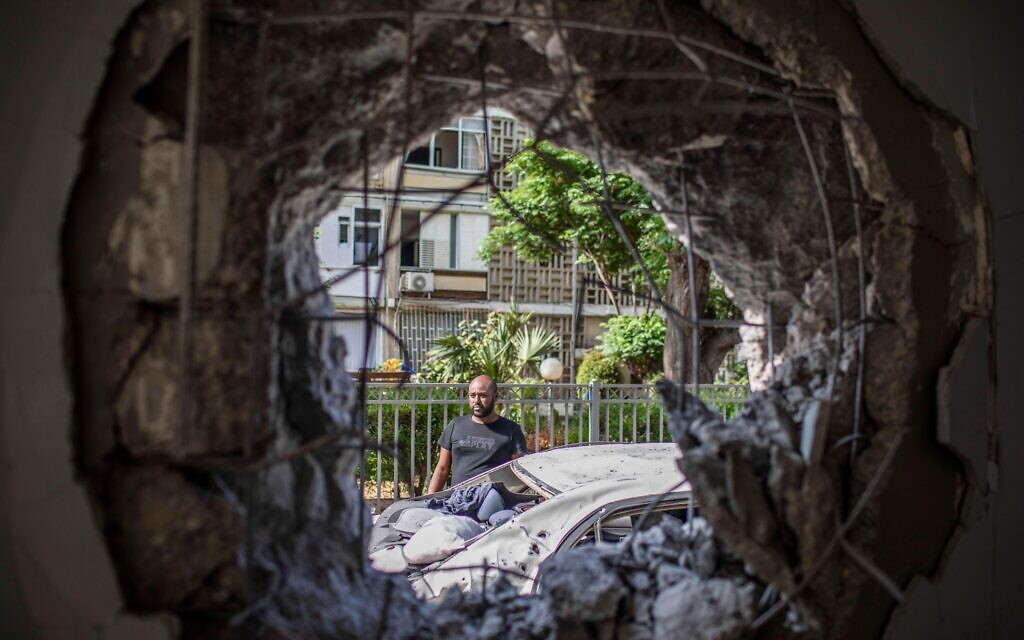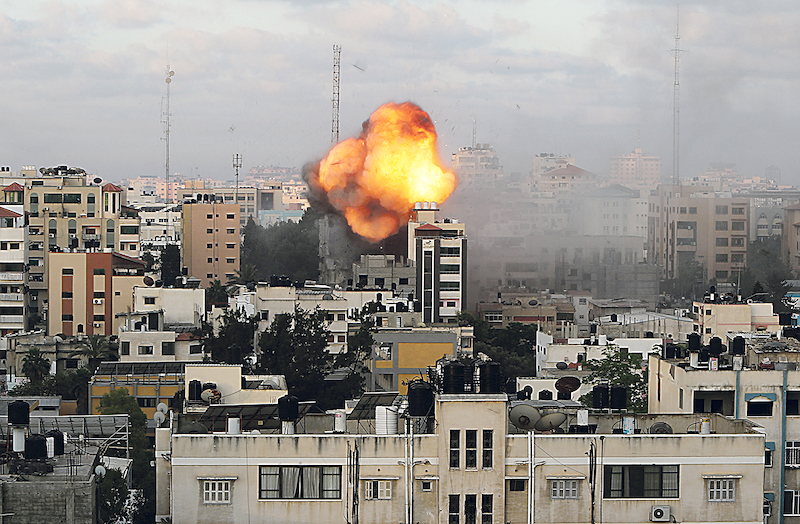Hopes raised that end to fighting could be in sight
As civil unrest and cross-border violence continues between Israelis and Palestinians, Michael Daventry looks for possible light at the end of the tunnel

On day nine, even as Israel insisted there was no timeframe for winding down the fighting in Gaza, the indications were that the end was now much closer than the beginning.
The hopes were raised by the fourth phone call in a week between Joe Biden and Benjamin Netanyahu. The US president told the Israeli prime minister that he expected a “significant de-escalation” within hours.
It was the most explicit sign yet that the White House’s indulgence, which made the United States become the only major country not to demand an immediate ceasefire over what it termed “Israel’s right to self-defence”, was over.
Get The Jewish News Daily Edition by email and never miss our top stories Free Sign Up

Meanwhile, as Hamas and Islamic Jihad continued to lob rockets into the sky and Israel pummelled Gaza, the conflict had changed: it was now being described in statistics, not events.
It was as if all sides had reached an unspoken agreement that numbers were the best way to describe what had spiralled into a cyclical routine.
The same thing happened in 2014, the last time Israel and Gaza confronted each other with this degree of rancour, but this year’s numbers were no less striking. Since Monday, 10 May, 12 people in Israel and at least 219 in Gaza have died and more than 1,500 injured.
The total number of rockets launched aimlessly towards southern Israel was close to 4,000. Most were intercepted by the Iron Dome missile defence system.
Hundreds of others fell short and landed in Gaza itself. However, the minority that made it through were sufficient to force thousands of Israelis from Ashkelon to Beersheba to spend successive nights in their bomb shelters.
Israel’s response – air strikes its Israel Defense Forces (IDF) said were
targeting infrastructure and fighters – was having a wider effect. Multiple high-rise blocks were flattened. At least 18 hospitals and clinics, including Gaza’s only Covid-19 testing facility, were destroyed. Some 58,000 Palestinians have fled their homes.
There were fewer signs of last week’s sectarian violence that tore through Israeli towns inhabited by both Jews and Arabs, but the anger was still
palpable.
On Tuesday, Palestinians called a strike, a protest that led to shutters dropping around the usually bustling markets of Jerusalem’s Old City.
In the West Bank, hundreds of Palestinians took to the streets, many hurling stones at an Israeli military checkpoint in Ramallah. Three Palestinians were killed. Two soldiers were wounded by gunshots.
Four rockets were launched from across Israel’s border with Lebanon. The IDF blamed a Palestinian faction. No casualties were reported.
A flurry of diplomacy has taken hold over the past week. Envoys from Egypt and Qatar waited several days for Israel’s response to the terms of a ceasefire deal reportedly agreed with Hamas. Germany’s Foreign Minister, Heiko Maas, was due in the region on Thursday for talks with Israelis and Palestinians.

Thank you for helping to make Jewish News the leading source of news and opinion for the UK Jewish community. Today we're asking for your invaluable help to continue putting our community first in everything we do.
For as little as £5 a month you can help sustain the vital work we do in celebrating and standing up for Jewish life in Britain.
Jewish News holds our community together and keeps us connected. Like a synagogue, it’s where people turn to feel part of something bigger. It also proudly shows the rest of Britain the vibrancy and rich culture of modern Jewish life.
You can make a quick and easy one-off or monthly contribution of £5, £10, £20 or any other sum you’re comfortable with.
100% of your donation will help us continue celebrating our community, in all its dynamic diversity...
Engaging
Being a community platform means so much more than producing a newspaper and website. One of our proudest roles is media partnering with our invaluable charities to amplify the outstanding work they do to help us all.
Celebrating
There’s no shortage of oys in the world but Jewish News takes every opportunity to celebrate the joys too, through projects like Night of Heroes, 40 Under 40 and other compelling countdowns that make the community kvell with pride.
Pioneering
In the first collaboration between media outlets from different faiths, Jewish News worked with British Muslim TV and Church Times to produce a list of young activists leading the way on interfaith understanding.
Campaigning
Royal Mail issued a stamp honouring Holocaust hero Sir Nicholas Winton after a Jewish News campaign attracted more than 100,000 backers. Jewish Newsalso produces special editions of the paper highlighting pressing issues including mental health and Holocaust remembrance.
Easy access
In an age when news is readily accessible, Jewish News provides high-quality content free online and offline, removing any financial barriers to connecting people.
Voice of our community to wider society
The Jewish News team regularly appears on TV, radio and on the pages of the national press to comment on stories about the Jewish community. Easy access to the paper on the streets of London also means Jewish News provides an invaluable window into the community for the country at large.
We hope you agree all this is worth preserving.
-
By Laurent Vaughan - Senior Associate (Bishop & Sewell Solicitors)
-
By Laurent Vaughan - Senior Associate (Bishop & Sewell Solicitors)
-
By Laurent Vaughan - Senior Associate (Bishop & Sewell Solicitors)
-
By Laurent Vaughan - Senior Associate (Bishop & Sewell Solicitors)






















